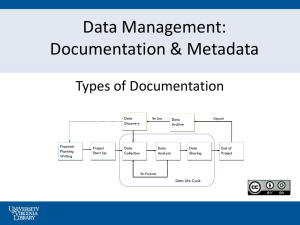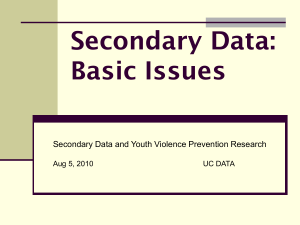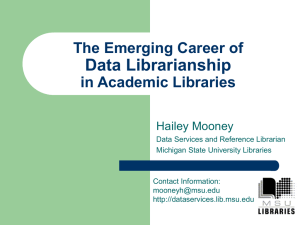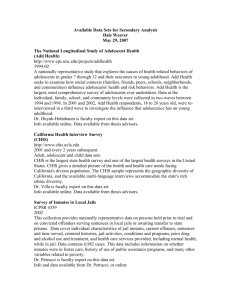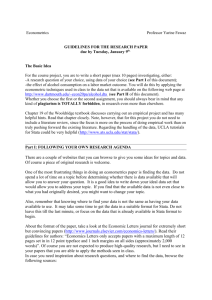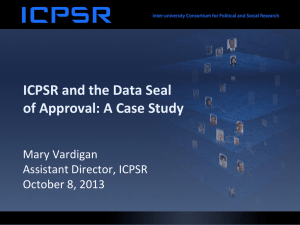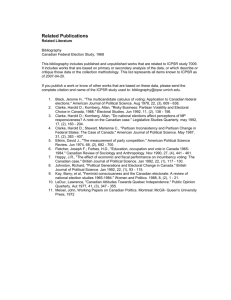ICPSR 50 Years of Data Sharing ICPSR Workshop, OSU Libraries
advertisement
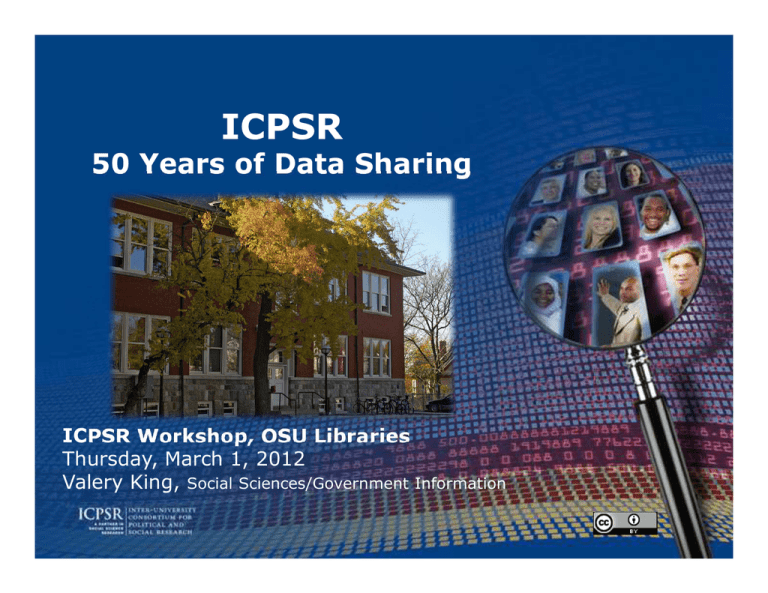
ICPSR 50 Years of Data Sharing ICPSR Workshop, OSU Libraries Thursday, March 1, 2012 Valery King, Social Sciences/Government Information Workshop Agenda • Data Exploration – – – – – Finding Data Website Orientation “Download” – A Definition MyData Account Search Strategies • Training and Instruction • Data Management (if time permits) – Data Management Plans – Secure Data Services But first, What is “ICPSR?” What is ICPSR? Inter-University Consortium for Political & Social Research • One of the world’s oldest and largest social science data archives, est. 1962 • Data distributed on punch cards, then reelto-reel tape • Now: – Data available on demand – Over 7,000 studies with over 65,000 data sets • Membership started with 21 universities – Currently about 700 members world-wide – Federal funding of public collections It’s All About Data! • Seek research data and pertinent documents from researchers (PIs, research agencies, government) • • • Process and preserve data and documents Disseminate data Provide education, training, & instructional resources Why People Use ICPSR • Write articles, papers, or theses using real research data • Conduct secondary research to support findings of current research or to generate new findings • Use as intro material in grant proposals • Preserve/disseminate primary research data – Fulfill data management plan (grant) requirements • Study or teach quantitative methods Supporting a growing number of disciplines • Anthropology • Communications • Criminal Justice • Demography • Economics • Education • Foreign Policy • Gerontology • Health & Medical Policy • History • International Relations • Law/Legal Services • Political Science • Psychology • Public Policy • Sociology Most Popular Downloads in 2010-11: • National Longitudinal Study of Adolescent Health • American National Election Study: 2008 Pre- and Post-Election Survey • National Survey on Drug Use and Health • General Social Surveys (1972-2008 Cumulative) • Chinese Household Income Project • Comparative Project on Class Structure and Class Consciousness • India Human Development Survey • National Survey of Midlife Development in the US • Collaborative Psychiatric Epidemiology Surveys • Children of Immigrants Longitudinal Survey Yes, there is International Data What’s in a “Download?” • Documentation files pdfs – Questionnaire – Codebook – Description & Citation • Data in many forms! – SPSS, SAS, Stata – ASCII Supporting the Data • Free user support • The HELP Page: – FAQs – User support (at ICPSR) email and phone contact – – – – information Data User Help Center: Short Tutorials & Webinars available 24/7 Local Support: Who to contact at your local institution Glossary of Terms Social Networks: Where you can find us on YouTube, Facebook, Twitter, Slideshare, and more Exploring the ICPSR Web site http://www.icpsr.umich.edu/ The MyData Account • MyData account – operates as authentication and like a shopping cart! • Authenticate once every six months on campus and you can carry it with you • Why do we ask questions about your department & status? • Let’s take a look: – Upper-left corner of every web page – https://www.icpsr.umich.edu/ticketlogin Finding Data The Challenge – Hoards of Data & Metadata How to make sense of: • • • • • 8,000 studies 65,000 datasets 550,000 files Millions of variables 60,000 bibliographic citations Exploring ICPSR’S Integrated Search Search Terms: teen drug use Reviewing the Study Home Page The Search Continues: Automatic Search Updates • Receive automatic updates on the study or series • And updates on your query The Bibliography of Data-related Literature It’s really a searchable database . . . containing 60,500 citations of known published and unpublished works resulting from analyses of data archived at ICPSR . . .that can generate study bibliographies associating each study with the literature about it . . . Now included in the integrated search on the ICPSR Web site Demonstrating the Impact of Research The Social Science Variables Database • Enables ICPSR users to search variables across datasets • Assists in: – – – – Data discovery Comparison/harmonization projects Data harvesting & data analysis Question mining for designing new research – Research methods & substantive courses instruction Interested in Online Datasets? “View SDA Studies” SDA Output Data Search within the Public Archives – Thematic Collections A search for data/documents from within a public archive defaults to searches of materials (data) within that archive • A strategy to help you narrow their scope • All materials are publicly available Why are Funders using ICPSR? • Dissemination Infrastructure • • • • – Systems & Search = technology, security, & metadata – Data Community Base (700 immediate members to share with) – Community Outreach/engagement expertise Preservation Fulfillment of Data Management Plan (Grant) Requirements Ability to Measure & Report Dissemination Statistics Secure Data Dissemination The Relationship Visual NACDA NAHDAP Research Connections SAMHDA ICPSR DSDR NCAA NACJD HMCA A common hub, yet each unique Training & Instruction ICPSR Summer Program in Quantitative Methods • Instruction on the tools and practices needed to analyze data • For those with math phobia and those with advanced analysis skills • 3-5 day workshops and 4-8 week courses • Primarily held in Ann Arbor, MI, on the campus of The University of Michigan, but some courses on other campuses also • http://www.icpsr.umich.edu/icpsrweb/sumprog/ Engaging Students Through Data • Supporting Quantitative Literacy – Becoming an important aspect of accreditation and campus requirements generally – social sciences provide context • Engages students with disciplines more fully – Active learning enhances teaching of content – Better picture of how social scientists work – Prevents some of the feelings of “disconnect” between substantive and technical courses • Piques student interest and opens the door to the world of data Bringing Data Into the Classroom • Easy to use features of ICPSR’s Website in classes – Social Science Variables Database – Bibliography of Data-Related Literature – SDA • Additionally, in partnership with teaching faculty, ICPSR has developed: – Online Learning Center (OLC) (Introductory/Substantive Courses) – Online tutorials – Online teaching modules – Student research opportunities The Online Learning Center: OLC • Tool to help develop classroom lectures and exercises that integrate data early into the learning process. • Intended for use in introductory-level substantive classes. • OLC addresses key concerns raised by teaching faculty in focus groups and in-depth interviews. • Requires no additional software. • www.icpsr.umich.edu/OLC • Webinar on using the OLC in class on ICPSR website How to Use the OLC – The Data-Driven Learning Guide • Choosing a DDLG – several search tools within the OLC • Faculty use of charts in class to introduce topic • Sending students to the Website to work through a DDLG in class or as homework • Using DDLG as part of larger project Online Modules EDRL ICSC SETUPS www.icpsr.umich.edu/E DRL/ www.icpsr.umich.edu/IC SC/ www.icpsr.umich.edu/SETUPS/ A Portal for Teaching With Data Research Opportunities for Students – Research paper competitions -- a research journal experience & cash prizes! – Paid student internships focusing on investigating social sciences research Data Management The Statement Heard Round the Research World: • The National Science Foundation has released a new requirement for proposal submissions regarding the management of data generated using NSF support. Starting in January, 2011, all proposals must include a data management plan (DMP). • The plan should be short, no more than two pages, and will be submitted as a supplementary document. The plan will need to address two main topics: – What data are generated by your research? – What is your plan for managing the data? ICPSR’s DMP Web Site www.icpsr.umich.edu/ICPSR/dmp/ Guidelines for Download ICPSR’s DMP Blog - FAQs http://datamanagementplans.blogspot.com/ Secure Data Services (Restricted-use Data) • Potential increase in demand for data management services as a result of grant/contract requirements • Increase in demand for processing, analysis, and distribution of sensitive data • Resulted in improvements focused on secure computing and data sharing environments at ICPSR Three Angles of Security • Secure Ingest • Secure Online Application & Tracking • Secure Computing in the Cloud For More Info: • Explore the website - www.icpsr.umich.edu/ICPSR/ • Sign up for our email announcements www.icpsr.umich.edu/ICPSR/org/lists/index.jsp • “Like” ICPSR on Facebook/follow ICPSR on Twitter • Attend or view our webinars (open to the public!) • Find this presentation on www.slideshare.net – search: icpsr • Contact user support – netmail@icpsr.umich.edu
